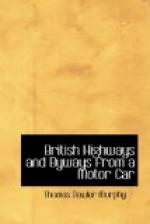Passing through the forest, we came to Epping, and from there into a stretch of open country that gave little suggestion of proximity to the world’s metropolis. Several miles through a narrow but beautifully kept byway brought us to the village of Chipping-Ongar, a place of considerable antiquity, and judging from the extensive site of its ancient castle, at one time of some military importance.
At Ongar we began our return trip to London over the road which we agreed was the most beautiful leading out of the city, for the suburbs do not extend far in this direction and one is comparatively soon in the country. The perfectly surfaced road, with only gentle slopes and curves, runs through the parklike fields, here over a picturesque stone bridge spanning a clear stream, there between rows of magnificent trees, occasionally dropping into quiet villages, of which Chigwell was easily the most delightful.
Chigwell became known to fame through the writings of Charles Dickens, who was greatly enamored of the place and who made it the scene of much of his story of “Barnaby Rudge.” But Dickens, with his eye for the beautiful and with his marvelous intuition for interesting situations, was drawn to the village by its unusual charm. Few other places can boast of such endorsement as he gave in a letter to his friend, Forster, when he wrote: “Chigwell, my dear fellow, is the greatest place in the world. Name your day for going. Such a delicious old inn facing the church; such a lovely ride; such glorious scenery; such an out-of-the-way rural place; such a sexton! I say again, name your day.” After such a recommendation, one will surely desire to visit the place, and it is pleasant to know that the “delicious old inn” is still standing and that the village is as rural and pretty as when Dickens wrote over sixty years since.




